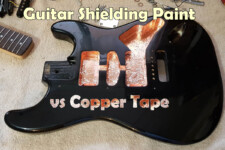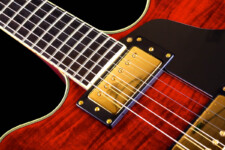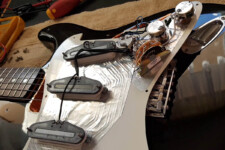Is Guitar Shielding Really Necessary (Does It Affect TONE)?
You have probably heard the loud buzzing that can happen when a guitar is played too close to an amp or other electrical equipment – but what can you do about it?
Sometimes it is question of where you play your guitar, and how important a clean sound is to you or your audience.
If you play live music on stage, or make recordings and your guitar has single coil pickups, then shielding is necessary to reduce buzz.
When Is Guitar Shielding Really Needed?
Shielding an electric guitar is really only necessary if you have single coil pickups and an electrically ‘noisy’ environment. Radio Frequency Interference (RFI) and Electromagnetic Frequency Interference (EMI) around your guitar can cause that all too familiar buzz through the amplifier.
Many electric guitars don’t have shielding in the electronics cavities, and if yours is one of those you might be wondering is it really worth adding shielding to your guitar, and what will it do to your guitar’s tone?
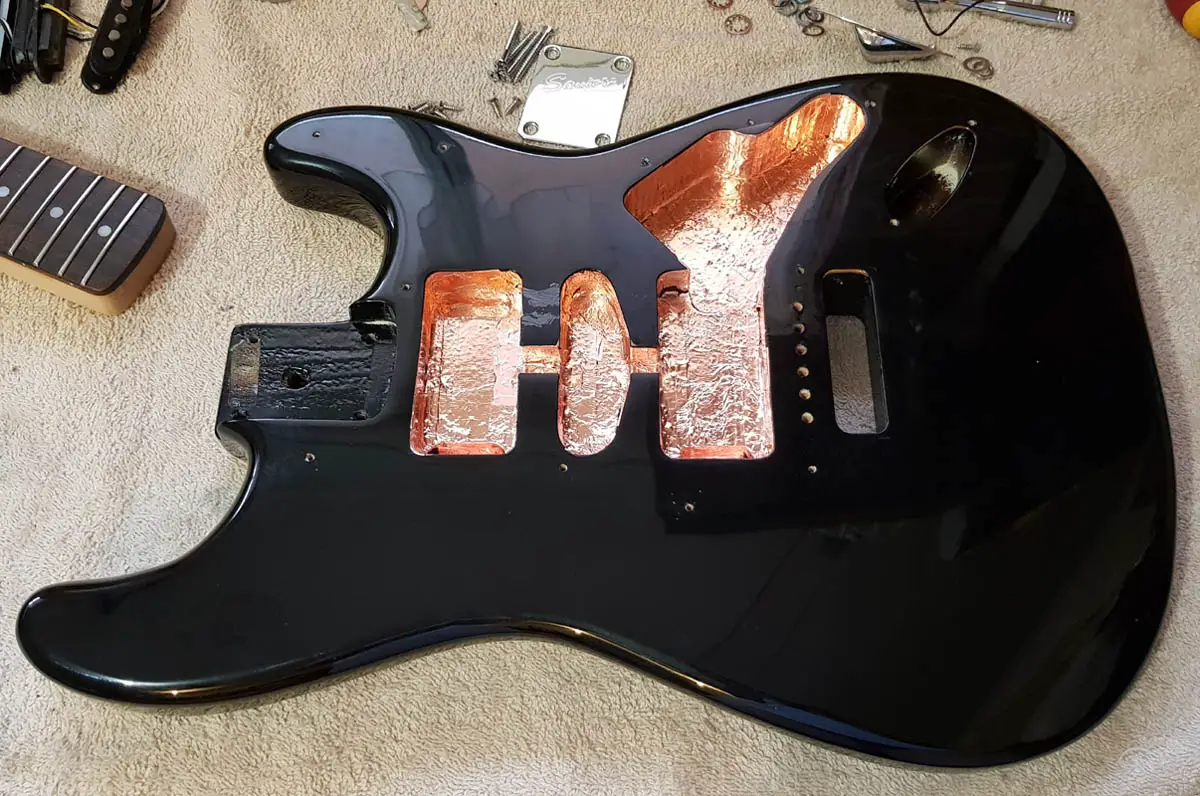
What Is Electric Guitar Shielding?
Shielding provides protection to the electronic components of your guitar from electromagnetic fields produced by electrical devices such as transformers or neon lighting nearby.
When you add shielding around the electronics of your guitar it forms a Faraday cage.
A Faraday cage is a continuous layer of conductive material (usually metal) with a hollow internal space.
Without being too technical, a Faraday cage essentially blocks frequently changing magnetic fields like the invisible field around mains wiring, fluorescent and neon lighting, computer monitors, etc.
Does Guitar Shielding Actually Work?
Electric guitars pick up most of the unwanted electromagnetic signal through the ground loop. This loop is formed through all the electrical equipment connected on a common circuit.
In a venue there could be many devices like televisions, audio mixers, lighting dimmers, or transformers connected to the same ground loop.
This will all cause the 60Hz frequency to induce a signal in guitar pickups that is then amplified through the sound system, and heard as hum.
Guitar shielding works very well to reduce buzz and is effective at blocking the unwanted signal since a Faraday cage cancels an electromagnetic field for anything inside the cage. It will not block hum from AC power sources.
As much as the pickups in an electric guitar pick up the hum, don’t forget that there is also wiring and electronic components to think about, and these components will also pick up noise if not shielded.
Shielding your guitar will help reduce static in dry conditions and assist with reducing buzzing when you are not touching the guitar strings.
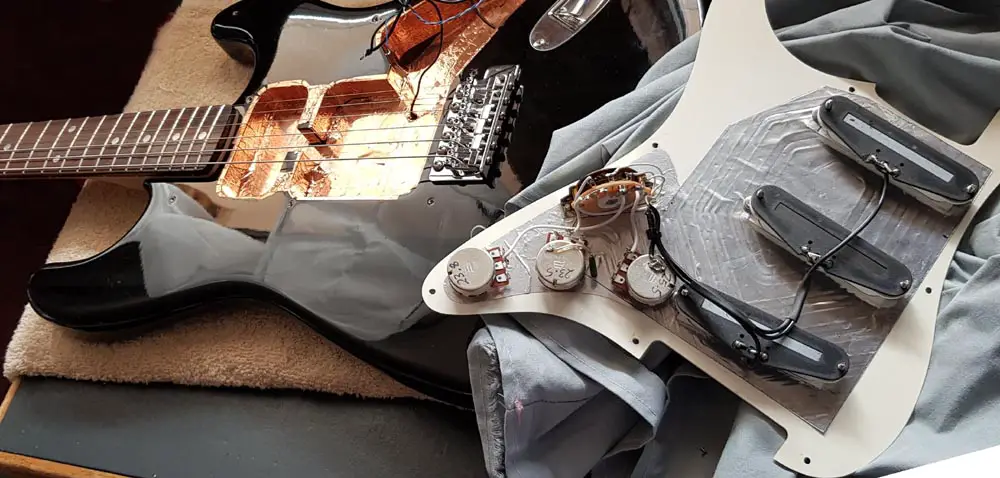
Does Shielding A Guitar Affect Its Tone?
There is plenty of debate surrounding the question of guitar shielding and tone, and there are generally two trains of thought:
- Shielding makes no difference to a guitar’s tone.
- Shielding although reducing hum takes away the high end of the sound.
Most guitarists agree that they cannot hear any change in the tone of a shielded guitar, and if anything the tone may sound different simply because there is less background buzz when playing.
Is Shielding Necessary For All Pickup Types?
Not all guitars need to be shielded to avoid excessive buzz, although for anyone performing regularly in different locations/venues it’s a good idea to have shielding as a precaution to avoid any unwanted surprises.
There are a range of different pickups you can use, and they all have their own characteristics, with some producing more hum than others.
Do Single Coil Pickups Need Shielding?
Single coil pickups are the worst offenders when it comes to humming noise, since these coils have a wire winding in only one direction, easily passing the 60Hz changing magnetic field through to the amp.
Many people love the authentic raw sound of single coil pickups, but if you don’t shield them you will find situations where there is far more buzz than you would like, and your band may not be so happy when you plug in!
Do Humbuckers Need Shielding?
Humbuckers are designed with two separate coils of wire connected in opposition to each other.
With their opposed windings, the two magnetic fields work in opposite directions, and the 60Hz frequency is effectively cancelled between the two coils.
Some twin-coil pickups are known as covered humbuckers and have a silver-nickel cover that acts as extra shielding to further reduce hum.
Since humbuckers are designed to ‘buck the hum’ it’s not really necessary to shield them, as there won’t be any useful reduction in buzz through an amplifier.
Do P-90 Pickups Need Shielding?
Although P-90 pickups look similar to humbuckers on the outside, internally they essentially share the same construction as single-coil pickups.
Given that they are single-coil pickups they are subject to hum and buzz, and shielding would certainly help to reduce EM Interference..
Do Active Pickups Need Shielding?
Active pickups are designed a little differently to passive pickups, having their own internal shielding and ground loop.
They are designed to be independent to the guitar’s ground circuit and won’t exhibit much hum through a sound system as a result.
It’s not necessary to shield active pickups for this reason.
Do Noiseless Pickups Need Shielding?
Noiseless pickups are designed as a replacement for single coil pickups and have the same external physical dimensions.
The design of noiseless pickups is the same concept as a humbucker, containing two coil windings, and are often known as single-coil stacks.
Since they are designed to eliminate hum you don’t need to place shielding around them.
Is It Really Worth Shielding A Guitar?
Unless you are using humbuckers, noiseless pickups, or active pickups, you will still get some amount of hum and buzz – and honestly there are no pickups that are completely noiseless.
The greatest advantage to shielding your guitar will be heard when playing in a venue with lots of electrical interference, such as a funky old bar.
If you have already opened up your guitar cavities, then it’s a good idea to put some shielding in since you now have easy access, and there is no harm doing it.
For a guitar with low-noise pickups it may not be worth shielding around the pickups themselves, however it is still worth shielding the plug cavity, and the switch/pot cavities.
If you shield the cavities and still get serious buzz, then it’s more likely to be a faulty ground circuit than a shielding problem.
How Do I Stop My Telecaster or Stratocaster From Humming?
Both these Fender guitar designs traditionally use single coil pickups, and there are a few ways you can reduce the hum.
1. As we previously discussed, you can shield the cavities of these guitars (and any others) to help reduce buzz.
2. You can also replace any 2-strand internal wiring with twisted-pair wires that are self-shielding.
3. A Stratocaster has 2 positions on it’s five-way switch that allow two pickups to be active at the same time. Due to the center pickup being wired in reverse to the bridge and neck pickups, this acts like a humbucker to reduce the hum.
4) For a Telecaster you could shield the cavity, or otherwise swap the pickup for a single-coil stacked pickup.
You can also use a multimeter to check ground continuity of the bridge plate.
How To Stop Hum & Buzz Without Shielding
Sometimes it’s not practical to change hardware in a guitar or put shielding in it, particularly if it’s a valuable vintage guitar that you don’t want to alter.
So, what else can you do apart from shielding to reduce noise?
1. Hum is picked up by instrument cables, especially long ones. Try to make sure your cables don’t run besides mains cables, or near transformers. Also don’t coil up long cables, as this can cause them to form weak magnetic fields.
2. EMI waves affect a guitar more in some directions than others, so try moving around the room and find a spot with less buzz, you may be surprised how effective this can be. Try turning around on the same spot to face in different directions and see what happens.
3. Most hum is noticeable when not playing, and many professional guitarists just turn down the volume in-between songs. No volume = no hum!
4. If you want a single foot pedal solution at a cost of around $100 or less, then take a look at noise gate pedals.
You can also get more expensive multi effects floor sound processors from around $500, and they are very effective at reducing hum and hiss through an amp.
The BOSS NS-2 Noise Suppressor is a good option
On A Higher Level…
If you’re running your sound through a mixing board then it probably has gating circuitry built in, and you can use this in conjunction with an isolation transformer to condition the sound system power supply.
Final Thoughts
Although shielding is not strictly necessary in guitars, there is no negative impact to installing shielding, and will generally reduce that annoying buzzing sound.
Shielding the cavities around the electronic components and wiring of a guitar will lower hum and buzz, but just keep in mind that it won’t be possible to eliminate them completely.
Should you glue the nut on guitars? …get the inside story
Sources
https://en.wikipedia.org/wiki/Faraday_cage
https://www.fralinpickups.com/2017/08/22/how-do-humbuckers-work/

